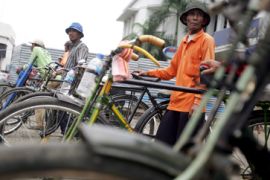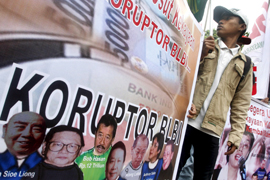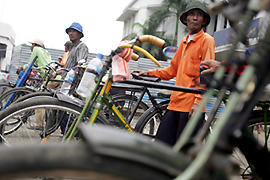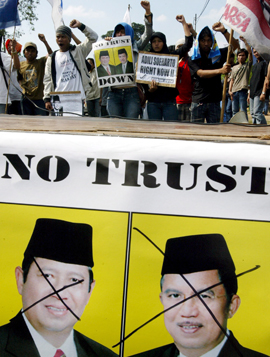Waiting for democracy’s dividend
For many of Indonesia’s poor democracy has brought few positive changes.

 |
| For many poor Indonesians life has actually got harder since Suharto’s fall [GALLO/GETTY] |
A decade after the upheaval that swept Indonesia’s former president Suharto from power, many Indonesians feel that the advent of democracy has brought few positive changes.
Despite 10 years of political and economic reforms – a process known as reformasi – there is a widespread disillusionment among the country’s poor.
| In depth |
The experience of 48 year–old Suni is typical of millions.
In the late 1990s Suni had his own small business selling snacks and cigarettes and earned a respectable wage of between $10 and $30 a day.
Today, working as a motorcycle taxi driver, he rarely makes the equivalent of $5 a day – a sum he says is not enough to eat and pay his rent.
“Since reformasi the prices of everything have just got worse and worse. Everything is too expensive, it’s not controlled by the government,” he says.
The student-led reformasi movement began as protests against the Suharto government’s failure to deal with the effects of the Asian financial crisis.
 |
| Anger at perceived high-level corruption remains widespread [EPA] |
Then the country was wracked by spiralling inflation, food shortages, skyrocketing unemployment and the plunging value of the national currency, the rupiah.
Since then Indonesia has become increasingly democratic; holding fair elections, creating one of Asia‘s freest press, providing greater protection for human rights, and reducing the role of the once all-powerful military.
But for Suni, many of these so-called freedoms have just led to more instability, and violence.
He points to frequent media reports of crime, high-level corruption as well as sectarian, ethnic and political violence.
Under Suharto, the tightly-controlled press rarely reported such news.
“Our nation can’t be given freedom, because we have minimal education,” he says, repeating a line frequently used during the Suharto era.
“If we’re given freedom – everyone will do their own thing. Those who benefit are just those with brains.”
|
In 10 years of reformasi there has been no change, except life is more difficult |
What Indonesia needs, he says, is a strong leader and democracy has failed to produce a leader of Suharto’s calibre.
“Since Suharto, there hasn’t been anyone like him, no one to replace him.”
At a nearby snack stall, 35-year-old Suryiadi also gives a sobering analysis of the economic and political changes wrought by the reform movement.
“In 10 years of reformasi there has been no change, except life is more difficult,” he says.
Broken promises
 |
| Many of Jakarta’s poor need to work second jobs simply to survive [EPA] |
“This democracy, it’s just about promises, and promises, but then the politicians never keep their promises.”
Echoing a familiar lament, Suryiadi says that under the former president, known affectionately as Pak Harto, ordinary workers found it much easier to make money and feed their families.
“It was good during the Pak Harto era. Things were cheap then, now everything is expensive,” he says.
Back then, Suryiadi had a car washing business in which he employed four people, making at least $10 a day. It was enough to support his family, send his two children to school and pay the rent.
Today he works two jobs – as a driver for a dentist and as a motorcycle taxi driver – but it still is not enough to pay the bills.
The only positive development, he says, is that under the current president, Susilo Bambang Yudhoyono, the worst corruptors are being prosecuted and jailed.
During the Suharto era corruption was rampant, with the former president’s family stealing $35bn, according to Transparency International.
|
he price of everything has gone up and us little people have been destroyed |
But on the streets of Jakarta, few people see reason to celebrate the 10th anniversary of Suharto’s downfall.
Thirty-year old Khulifah is another part of the army of informal workers that have appeared on Jakarta’s streets over the last decade, struggling to eke out an existence from the most marginal occupations.
A mother of one, she scratches a living as a “jockey” – an occupation that did not even exist 10 years ago.
Every morning she tries to hitch a ride in commuters’ cars, so the owners can get around traffic regulations requiring vehicles travelling on main roads to carry at least three people during peak hours.
Jockeying is risky: if Khulifah is caught by the frequent police raids she could be jailed for a month, or forced to pay a fine equal to a month’s wages.
Despite the risks, competition is tough. Every evening and morning, hundreds of jockeys line roads leading to Jakarta‘s main roads.
With so many jockeys lining Jakarta’s streets, Khulifah is only occasionally able to hitch a ride.
On a good day she can make $10-$20, but it is not enough to feed herself, she says, and so she, like many other jockeys, has a second job as a maid.
No improvement
 |
| A failure to deliver improvements means many have lost faith in government [EPA] |
Like Suryiadi and Suni, Khulifah can see little benefit from the political freedoms wrought by reformasi, and the direct election of Yudhoyono, popularly known as SBY.
“SBY is the worse, because the price of everything has gone up and us little people have been destroyed,” she says.
Economists agree that the reform movement has brought few improvements, with the World Bank reporting almost half the population living on $2 a day or less.
“For common people we don’t see much improvement compared to before the crisis,” says Umar Juoro, an economics analyst with the Centre for Strategic and International Studies in Jakarta.
“At that time poverty was around 17 per cent and now it’s 17 per cent, but food is much more expensive than at that time.”
Ten years on from the downfall of Suharto, Indonesia in 2008 looks a lot like Indonesia in 1998.
Food prices are spiralling, rising 15.7 per cent in April, cooking oil has doubled in price, and the cost of tempe, a soya bean cake that is a popular source of protein for the poor, has soared.
Reformasi has not helped the poor, but it has drastically altered Indonesia’s business landscape and created a more competitive business environment, says Juoro.
The country’s bloated crony conglomerates, which grew wealthy as a result of Suharto’s patronage, have had their power and influence sharply reduced.
“For the big conglomerates, unless they’re good companies it’s difficult for them to survive,” Juoro says.
Boom time for some
But the government says the opening up of Indonesia‘s economy has lured foreign investors back to Indonesia, creating the sharpest economic growth in a decade.
Last year, it says, economic growth hit 6.3 per cent and a million people entered the workforce.
A quick tour around the capital confirms that middle class and upper middle class Indonesians have more money than ever.
The property market is booming, with cranes dotting the skyline building new malls, apartment complexes and office towers.
No less than three new luxury malls have been built in central Jakarta over the past 18 months while sales of cars and motorcycles have hit new highs.
The government also says that its pro-poor policies, which include a planned cash handout to 19 million people this year, as well as welfare benefits for the poor who keep their children in school, have helped reduce poverty levels.
But Fauzi Ichsan, chief economist with Standard Chartered Bank, agrees with the motorcycle taxi drivers.
The political and economic changes of the last decade, he says, have mostly benefited the middle class and upper classes, or foreign investors.
“Reformasi benefited Indonesia politically, benefiting civil society, non-government groups, the media, labour unions,” he says. “But on the other hand democratisation has not ensured just, equitable growth.”
Economic reforms have attracted foreign investors into the banking, telecom and retail industries, as well as investment in local stocks, he argues. But they have failed to improve the lives of Indonesia‘s poorest.
“The problem with reforms they make – they’re good for investors, particularly foreign investors – but for poor, the standard of living has not increased dramatically. In fact it has deteriorated.”
